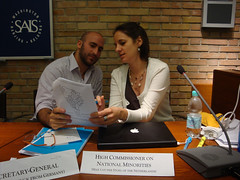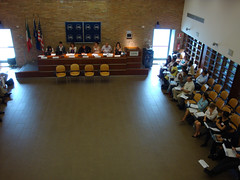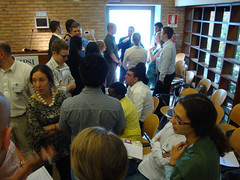 Thursday was another beautiful sunny day in Bologna! We had an early start in preparation for our morning activity: a simulation of a peace conference that could have taken place at the Organisation for Security and Cooperation in Europe (OSCE) in 1993 to resolve the conflict in Bosnia-Herzegovina. In 1993, the UN/EC Vance Owen plan to resolve the conflict had just been rejected, and in this exercise, we were given the opportunity to simulate a peace conference that the OSCE could have held in order to resolve the conflict. All the symposium participants came together in their assigned roles as either OSCE officials or country representatives to achieve this goal.
Thursday was another beautiful sunny day in Bologna! We had an early start in preparation for our morning activity: a simulation of a peace conference that could have taken place at the Organisation for Security and Cooperation in Europe (OSCE) in 1993 to resolve the conflict in Bosnia-Herzegovina. In 1993, the UN/EC Vance Owen plan to resolve the conflict had just been rejected, and in this exercise, we were given the opportunity to simulate a peace conference that the OSCE could have held in order to resolve the conflict. All the symposium participants came together in their assigned roles as either OSCE officials or country representatives to achieve this goal.
 Within the three-hour simulation, the OSCE Chair-in-Office, with assistance from his OSCE officials, did an excellent job presiding over the conference. He ensured that we efficiently completed three phases of the conference: 1) presentation of country interests, 2) proposals for plans, and 3) approval of plans. As challenges and issues arose, the countries split into working groups to discuss aspects of the proposed plan including: 1) the terms of the ceasefire agreement, 2) peacekeeping forces, and 3) the humanitarian situation. Within 40 minutes, each of the groups managed to come to agreements on some points that constituted the basis for the final plan. Of course the complexity of the situation and the limited time allocated for the simulation meant that there were still many details of the plan that would have still needed to be worked out, but the groundwork for a more comprehensive agreement was completed and also approved by all the representatives present.
Within the three-hour simulation, the OSCE Chair-in-Office, with assistance from his OSCE officials, did an excellent job presiding over the conference. He ensured that we efficiently completed three phases of the conference: 1) presentation of country interests, 2) proposals for plans, and 3) approval of plans. As challenges and issues arose, the countries split into working groups to discuss aspects of the proposed plan including: 1) the terms of the ceasefire agreement, 2) peacekeeping forces, and 3) the humanitarian situation. Within 40 minutes, each of the groups managed to come to agreements on some points that constituted the basis for the final plan. Of course the complexity of the situation and the limited time allocated for the simulation meant that there were still many details of the plan that would have still needed to be worked out, but the groundwork for a more comprehensive agreement was completed and also approved by all the representatives present.
 The simulation was the first opportunity for our entire group to collaborate on achieving a resolution to a conflict. It was a difficult and sometimes stressful experience, especially when country representatives began to present their countries’ diverse perspectives and demands that all needed to be taken into consideration. We also quickly recognized the challenges of having the parties to the conflict, the Bosniaks, Bosnian Serbs, Bosnian Croats and Federal Republic of Yugoslavia, only present as observers at the conference although their concerns and perspectives were critical to resolving the conflict.
The simulation was the first opportunity for our entire group to collaborate on achieving a resolution to a conflict. It was a difficult and sometimes stressful experience, especially when country representatives began to present their countries’ diverse perspectives and demands that all needed to be taken into consideration. We also quickly recognized the challenges of having the parties to the conflict, the Bosniaks, Bosnian Serbs, Bosnian Croats and Federal Republic of Yugoslavia, only present as observers at the conference although their concerns and perspectives were critical to resolving the conflict.
Many of us had never been involved in a multilateral conflict resolution simulation similar to this before, and we found it to be a very interesting and beneficial experience. Over the course of the symposium, we will have many more opportunities to participate in similar exercises and simulations and further improve our conflict resolution skills.
Katharine Mote, UK

